|
Books Should Be Free Loyal Books Free Public Domain Audiobooks & eBook Downloads |
|
|
Books Should Be Free Loyal Books Free Public Domain Audiobooks & eBook Downloads |
|
Kid's Books |
|---|
|
Book type:
Sort by:
View by:
|
By: Various | |
|---|---|
 Childhood's Favorites and Fairy Stories
Childhood's Favorites and Fairy Stories
Since this series of books is intended for all young people from one to one hundred, it opens with about eighty of the old MOTHER GOOSE RHYMES. Nothing better was ever invented to tell to little folks who are young enough for lullabies. Their rhythm, their humor, and their pith will always cause us to prize them as the Babies’ Classics. Editors: Hamilton Wright Mabie, Edward Everett Hale, William Byron Forbush.(Gutenberg Text) | |
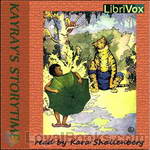 Kayray's Storytime
Kayray's Storytime
A collection of my favorite short children's stories and rhymes. | |
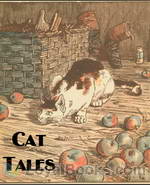 Cat Tales
Cat Tales
Cat Tales is the first of a series of kid-friendly collections of animal stories and non-fiction. There’ll be one or two grade-school-level texts on the animal, with eight-nine fiction works. Source for these is Project Gutenberg. | |
 A Soup of Alphabets from A-Z
A Soup of Alphabets from A-Z
A collection of children’s alphabet rhymes including Footsteps On the Road to Learning – a short text from 1850 which teaches children the English alphabet in rime–so that a child may not become a dunce! The Anti Slavery Alphabet – a book prepared to encourage young children to speak against the institution of slavery in 19th century United States. The method used is an alphabetical listing of the evils of slavery. The Peter Pan Alphabet and The Alphabet of Celebrities – Oliver Herford’s teaching guides to the English alphabet–using Peter Pan and famous names! | |
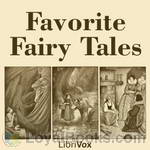 Favorite Fairy Tales
Favorite Fairy Tales
This book of favorite fairy tales was compiled and illustrated by Peter Newell. it includes Jack The Giant Killer; Cinderella; Sleeping Beauty; Little Red Riding Hood; Aladin and the Wonderful Lamp, The Ugly Duckling, Beauty and the Beast, Snow White and Rose Red, The Wild Swans, Ali Baba and the 40 Thieves, and 4 others that are not so famous. The stories included were based upon the those that various famous men remembered as their favorites when children | |
 Cocoa Break Collection
Cocoa Break Collection
Following in the vein of my Coffee-Break collections, this is a collection of short (all under 15 minutes) stories for kids. Focus is on fables and fairy tales published before 1923. | |
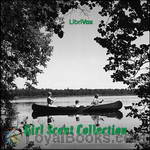 Girl Scout Collection
Girl Scout Collection
These articles, pamphlets, and stories relating to the Girls Scouts of America touch on the history, activities, ideals, and traditions of this remarkable girls' organization. Though some of the articles appear redundant, they were selected to represent a contemporary view spanning five years of the organization's early popularity (1917-1921). Of significance are the detailed descriptions of Girl Scout involvement in war work during what is now known as World War I. Girl Scouts were prepared through their training for merit badges to be independent, resourceful, reliable, and helpful... | |
 Boys and Girls Bookshelf; a Practical Plan of Character Building, Volume I (of 17) Fun and Thought for Little Folk
Boys and Girls Bookshelf; a Practical Plan of Character Building, Volume I (of 17) Fun and Thought for Little Folk
| |
 Boys and Girls Bookshelf (Vol 2 of 17) Folk-Lore, Fables, And Fairy Tales
Boys and Girls Bookshelf (Vol 2 of 17) Folk-Lore, Fables, And Fairy Tales
| |
 Poems Teachers Ask For, Book Two
Poems Teachers Ask For, Book Two
| |
 Dear Santa Claus
Dear Santa Claus
| |
 Our Boys Entertaining Stories by Popular Authors
Our Boys Entertaining Stories by Popular Authors
| |
 Poems Teachers Ask For Selected by readers of "Normal Instructor-Primary Plans"
Poems Teachers Ask For Selected by readers of "Normal Instructor-Primary Plans"
| |
 Tiger and Tom and Other Stories for Boys
Tiger and Tom and Other Stories for Boys
| |
 Chatterbox, 1906
Chatterbox, 1906
| |
 Golden Days for Boys and Girls, Vol. XIII, Nov. 28, 1891
Golden Days for Boys and Girls, Vol. XIII, Nov. 28, 1891
| |
 Aunt Kitty's Stories
Aunt Kitty's Stories
| |
 Our Young Folks, Vol 1, No. 1 An Illustrated Magazine
Our Young Folks, Vol 1, No. 1 An Illustrated Magazine
| |
 The Girl's Own Paper, Vol. VIII, No. 354, October 9, 1886
The Girl's Own Paper, Vol. VIII, No. 354, October 9, 1886
| |
 The Youth's Companion Volume LII, Number 11, Thursday, March 13, 1879
The Youth's Companion Volume LII, Number 11, Thursday, March 13, 1879
| |
 Little Folks (July 1884) A Magazine for the Young
Little Folks (July 1884) A Magazine for the Young
| |
 Happy Days for Boys and Girls
Happy Days for Boys and Girls
| |
 St. Nicholas Magazine for Boys and Girls, Vol. 5, Nov 1877-Nov 1878 Scribner's Illustrated
St. Nicholas Magazine for Boys and Girls, Vol. 5, Nov 1877-Nov 1878 Scribner's Illustrated
| |
 The Empire Annual for Girls, 1911
The Empire Annual for Girls, 1911
| |
 Little Folks (December 1884) A Magazine for the Young
Little Folks (December 1884) A Magazine for the Young
| |
 Little Folks A Magazine for the Young (Date of issue unknown)
Little Folks A Magazine for the Young (Date of issue unknown)
| |
 Our Young Folks—Vol. I, No. II, February 1865 An Illustrated Magazine for Boys and Girls
Our Young Folks—Vol. I, No. II, February 1865 An Illustrated Magazine for Boys and Girls
| |
 Little Folks (October 1884) A Magazine for the Young
Little Folks (October 1884) A Magazine for the Young
| |
 Graded Memory Selections
Graded Memory Selections
| |
 Little Folks (Septemeber 1884) A Magazine for the Young
Little Folks (Septemeber 1884) A Magazine for the Young
| |
 Little Folks (November 1884) A Magazine for the Young
Little Folks (November 1884) A Magazine for the Young
| |
 A Book of Natural History
A Book of Natural History
YOUNG FOLKS' LIBRARYA BOOK OF NATURAL HISTORYTHE WONDER OF LIFE, BY PROFESSOR, T. H. HUXLEY. Every one has seen a cornfield. If you pluck up one of the innumerable wheat plants which are fixed in the soil of the field, about harvest time, you will find that it consists of a stem which ends in a root at one end and an ear at the other, and that blades or leaves are attached to the sides of the stem. The ear contains a multitude of oval grains which are the seeds of the wheat plant. You know that when these seeds are cleared from the husk or bran in which they are enveloped, they are ground into fine powder in mills, and that this powder is the flour of which bread is made... | |
 Young Folks' Library
Young Folks' Library
Young Folks' Library, Selections from the Choicest LiteratureTHE MARVELS OF NATURE BY EDWARD S. HOLDEN, M.A., Sc.D. LL.D. The Earth, the Sea, the Sky, and their wonders--these are the themes of this volume. The volume is so small, and the theme so vast! Men have lived on the earth for hundreds of the sands of years; and its wonders have increased, not diminished, with their experience. To our barbarous ancestors of centuries ago, all was mystery--the thunder, the rainbow, the growing corn, the ocean, the stars... | |
 Chatterbox, 1905
Chatterbox, 1905
CHATTERBOXBy J. Erskine Clarke, M.A.CRUISERS IN THE CLOUDS.In the chimney corner of a cottage in Avignon, a man sat one day watching the smoke as it rose in changing clouds from the smouldering embers to the sooty cavern above, and if those who did not know him had supposed from his attitude that he was a most idle person, they would have been very far from the truth. It was in the days when the combined fleets of Europe were thundering with cannon on the rocky walls of Gibraltar, in the hope of driving the English out, and, the long effort having proved in vain, Joseph Montgolfier, of whom we have spoken, fell to wondering, as he sat by the fire, how the great task could be accomplished... | |
 Christmas Miscellany 2018
Christmas Miscellany 2018
Sixteen Christmas stories or essays. | |
 Travel Stories Retold From St. Nicholas
Travel Stories Retold From St. Nicholas
St. Nicholas was a popular magazine aimed at young folks in the late nineteenth – early twentieth century. Its articles were usually well-written and often by authors who became famous later on. This collection of articles published in 1920, aimed at the youth market, can be easily enjoyed by adults as well. - Summary by David Wales | |
 Animal Story Book
Animal Story Book
Edited by Andrew Lang, this book is an anthology of interesting stories about a wide variety of diffferent animals collected from numerous sources. - Summary by Elsie Selwyn | |
By: Victor Appleton (1873-1962) | |
|---|---|
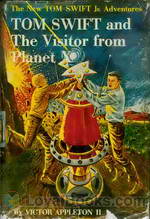 Tom Swift and the Visitor From Planet X
Tom Swift and the Visitor From Planet X
If you haven't come across the 200-book series about Tom Swift Jr, this book would be an interesting one to start with. The series is aimed at the young adult readership, probably male, and the young adolescent hero, Tom Swift Jr is the son of Tom Swift Sr. The books portray the perennially 18-year-old Tom, a tall and angular youngster, possessed of a very high intelligence and presence of mind. Regular characters include his parents, younger sister Sandy, best buddy Bud Barclay, his regular date Phyllis Newton, and the comic roly-poly Chow Winkler... | |
 Tom Swift and His Aerial Warship, or, the Naval Terror of the Seas
Tom Swift and His Aerial Warship, or, the Naval Terror of the Seas
Tom Swift is an inventor, and these are his adventures. The locale is the little town of Shopton in upstateNew York, near Lake Carlopa. While some of Tom’s inventions are not well-founded in a scientific sense, others elaborated developments in the news and in popular magazines aimed at young science and invention enthusiasts. Presenting themselves as a forecast of future possibilities, they now and then hit close to the mark. Some predicted inventions that came true include “photo telephones”, vertical takeoff aircraft, aerial warships, giant cannons, and “wizard” cameras... | |
 Tom Swift in the Land of Wonders
Tom Swift in the Land of Wonders
Tom Swift is the young protagonist in a series of juvenile adventure novels which began in the early twentieth century and continue to the present. Tom Swift is a genius inventor whose breakthroughs in technology (especially transport technology) drive the plots of the novels, placing them in a genre sometimes called “invention fiction” or “Edisonade”. This book is the 20th in the original series published from 1910 -1942, written by a ghost writer using the name of Victor Appleton. This adventure takes Tom and his cohorts to Honduras in search of a Mayan idol of gold. | |
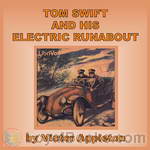 Tom Swift and his Electric Runabout
Tom Swift and his Electric Runabout
Tom Swift enters an upcoming race with his specially-designed prototype electric race car. But as he makes the final preparations and adjustments, days before the race, he discovers a plot that would bankrupt not only his family, but also everyone else that relies on the local bank (which is the target of a nefarious bank-run scheme). Tom must solve the mystery and stop the criminals behind the plot before he’ll test himself on a 500 mile race against some of the best electric cars and skilled drivers in the United States... | |
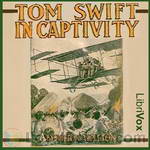 Tom Swift in Captivity
Tom Swift in Captivity
Tom Swift is approached by Mr. Preston, the owner of a circus, and begins to tell the story of Jake Poddington, Mr. Preston's most skilled hunter. As it turns out, Jake went missing just after sending word to Preston that Jake was on the trail of a tribe of giants, somewhere in South Africa. That was the last Preston has heard of Jake Poddington. Preston would like Tom to use one of his airships to search for Poddington, and if possible, bring back a giant for the circus.Listeners are forewarned that some elements and characters included in Tom Swift books portray certain ethnic groups in a very dated manner that modern readers, and listeners, may find offensive... | |
 Tom Swift and His Wireless Message
Tom Swift and His Wireless Message
Tom Swift & friends decide to trial an experimental airship near the New Jersey coast, and are unexpectedly swept out to sea by hurricane winds. Unable to steer or navigate without tearing the airship apart, the hapless crew must simply let the storm take them wherever it will. Unfortunately, the storm proves too much for the craft and Tom makes a crash landing on the uninhabited and crumbling Earthquake Island. | |
 Tom Swift and His Sky Racer
Tom Swift and His Sky Racer
A $10,000 prize lures Tom into competing at a local aviation meet at Eagle Park. Tom is determined to build the fastest plane around, but his plans mysteriously disappear, which means Tom must redesign his new airplane from the beginning. | |
By: W. S. Gilbert (1836-1911) | |
|---|---|
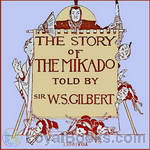 The Story of the Mikado
The Story of the Mikado
The Mikado is the ninth of the 14 Gilbert and Sullivan musical collaborations. It opened in 1885, had the second longest run for any work of musical theatre of the time, and remains the most frequently performed Gilbert and Sullivan. It was adapted as a children's book by W. S. Gilbert entitled The Story of The Mikado, which was Gilbert's last literary work (and published posthumously). It is a retelling of The Mikado, with various changes to simplify language or make it more suitable for children... | |
 The Story of the H.M.S. Pinafore
The Story of the H.M.S. Pinafore
H.M.S. Pinafore; or, The Lass That Loved a Sailor, is a comic opera in two acts, with music by Arthur Sullivan and a libretto by W. S. Gilbert. It opened in London, England, on 25 May 1878 and ran for 571 performances, which was the second-longest run of any musical theatre piece up to that time. H.M.S. Pinafore was Gilbert and Sullivan's fourth operatic collaboration and their first international sensation. This is not that opera.It was adapted as a children's book by W. S. Gilbert entitled The Story of HMS Pinafore, or The Pinafore Picture Book, and includes some lovely illustrations by Alice B... | |
 Pinafore Picture Book: The Story Of H.M.S. Pinafore (Version 2)
Pinafore Picture Book: The Story Of H.M.S. Pinafore (Version 2)
Pinafore’s sublimely silly story is made even sillier by this 1908 story version of the 1878 Gilbert and Sullivan operetta. Gilbert, the author of the operetta’s lyrics, writes this version of the story with his tongue planted firmly in his cheek. Most adults and children will find this version vastly amusing. - Summary by David Wales | |
By: Waldemar Bonsels (1880-1952) | |
|---|---|
 The Adventures of Maya the Bee
The Adventures of Maya the Bee
A little bee is born in a large and busy hive. At that time, the hive is going through a period of unrest and there are fears that it will become subdivided into separate colonies. The little new-born, Maya, is under the care of a strict but loving teacher. One day, driven by curiosity and rebellion, Maya escapes from the safe environs of the hive and flies into the forest. Here, she encounters all sorts of interesting, exciting, frightening and funny things. The Adventures of Maya the Bee is the story of the intriguing days that follow... | |
By: Walter Aimwell (1822-1859) | |
|---|---|
 Oscar The Boy Who Had His Own Way
Oscar The Boy Who Had His Own Way
| |
By: Walter Barnes (1880-) | |
|---|---|
 Types of Children's Literature
Types of Children's Literature
| |
By: Walter Crane (1845-1915) | |
|---|---|
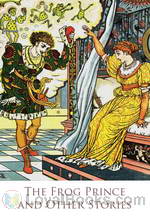 The Frog Prince and Other Stories
The Frog Prince and Other Stories
The three charming stories contained in The Frog Prince and Other Tales include a less-known fairy-tale called Princess Belle-Etoile besides the title story and Alladin and the Wonderful Lamp. Published in 1874, the tales are re-told by the famous illustrator Walter Crane, who has also provided some of the most lovely illustrations in the book. The book makes an ideal gift and both parents and children will certainly enjoy it. It's perfect for bedtime story-reading sessions and kids would love gazing at the beautiful Greek-style illustrations that are scattered throughout the book... | |
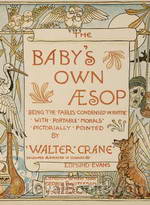 Baby's Own Aesop
Baby's Own Aesop
“Baby’s Own Aesop” presents the fables as one-stanza limericks, each “pictorially pointed” by Walter Crane, the noted painter and illustrator. He apprenticed to master wood-engraver, William James Linton, who furnished the draft of the book’s poems for Crane to edit. | |
 The Absurd ABC
The Absurd ABC
| |
 The Song of Sixpence Picture Book
The Song of Sixpence Picture Book
| |
 An Alphabet of Old Friends
An Alphabet of Old Friends
| |
By: Walter De la Mare (1873-1956) | |
|---|---|
 The Three Mulla-mulgars
The Three Mulla-mulgars
Three monkey brothers, Thumb, Thimble, and Nod, are Mulla-mulgars or royal monkeys. As she dies, their mother gives them the enchanted Wonderstone for protection, and tells them to follow their father. They embark on a journey of fantastical adventure to find their father, who left years earlier in search of the kingdom of his brother, the Prince of the Valleys of Tishnar, promising to return for them after he had found the way. | |
 Songs of Childhood
Songs of Childhood
| |
 Peacock Pie: A Book of Rhymes
Peacock Pie: A Book of Rhymes
These wonderful, whimsical poems from the incomparable Walter de la Mare describe the bliss of childhood, explore the marvel of a child's imagination and portray the intriguing landscapes of existences both lived and imagined by a young mind in a magical kingdom located somewhere between daydream and caprice. In these poems we experience aspects of a reality unencumbered by concern, unhindered by anxiety, and share an imagination free to wander, ponder, contemplate, envision and express itself in a marvelous mosaic of impression, inspiration and introspection... | |
By: Wilhelm Busch (1832-1908) | |
|---|---|
 Max and Maurice a juvenile history in seven tricks
Max and Maurice a juvenile history in seven tricks
| |
By: Wilhelm Hauff (1802-1827) | |
|---|---|
 The Oriental Story Book A Collection of Tales
The Oriental Story Book A Collection of Tales
| |
By: Willa Sibert Cather (1873-1947) | |
|---|---|
 The Song of the Lark
The Song of the Lark
| |
By: William A. Alcott (1798-1859) | |
|---|---|
 The Young Mother Management of Children in Regard to Health
The Young Mother Management of Children in Regard to Health
| |
By: William Alexander Hammond (1828-1900) | |
|---|---|
 Fasting Girls Their Physiology and Pathology
Fasting Girls Their Physiology and Pathology
| |
By: William Dean Howells | |
|---|---|
 Christmas Every Day and Other Stories Told for Children
Christmas Every Day and Other Stories Told for Children
Five short delightful stories for children, told in the voice of "the papa" to "the girl" and "the boy." William Dean Howells (March 1, 1837 – May 11, 1920) was an American realist author and literary critic. Nicknamed "The Dean of American Letters", he was particularly known for his tenure as editor of the Atlantic Monthly as well as his own prolific writings, including the Christmas story "Christmas Every Day" and the novel The Rise of Silas Lapham. (Reader’s Note for story 3: A pony engine is a small locomotive for switching cars from one track to another.) | |
 The Flight of Pony Baker A Boy's Town Story
The Flight of Pony Baker A Boy's Town Story
| |
By: William Ernest Henley (1849-1903) | |
|---|---|
 Lyra Heroica A Book of Verse for Boys
Lyra Heroica A Book of Verse for Boys
| |
By: William H. Barker (1882-1929) | |
|---|---|
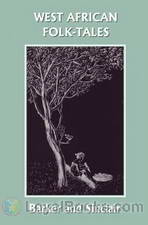 West African Folk Tales
West African Folk Tales
Compiled by an American missionary, West African Folk Tales by William H Barker is a delightful collection of folk tales from Nigeria, Ghana, Mali, Mauritania and other countries along the west coast of Africa. These stories spread in various forms to other countries like the West Indies, Suriname, the Netherland Antilles, etc and can be still heard today among the people of these countries. West African Folk Tales is a wonderful read for both young people and older readers alike. The stories are charmingly retold... | |
By: William Heaford Daubney | |
|---|---|
 The Three Additions to Daniel, a Study
The Three Additions to Daniel, a Study
| |
By: William Henry Giles Kingston | |
|---|---|
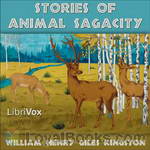 Stories of Animal Sagacity
Stories of Animal Sagacity
300+ short stories of how smart and savvy various individual animals have been seen to be, and in most cases a little moral is drawn from the story. | |
 Michael Penguyne Fisher Life on the Cornish Coast
Michael Penguyne Fisher Life on the Cornish Coast
| |
 Taking Tales Instructive and Entertaining Reading
Taking Tales Instructive and Entertaining Reading
| |
 The Story of Nelson also "The Grateful Indian", "The Boatswain's Son"
The Story of Nelson also "The Grateful Indian", "The Boatswain's Son"
| |
 The History of Little Peter, the Ship Boy
The History of Little Peter, the Ship Boy
| |
 Mary Liddiard The Missionary's Daughter
Mary Liddiard The Missionary's Daughter
| |
 Archibald Hughson An Arctic Story
Archibald Hughson An Arctic Story
| |
 Norman Vallery or, How to Overcome Evil with Good
Norman Vallery or, How to Overcome Evil with Good
| |
By: William Makepeace Thackeray (1811-1863) | |
|---|---|
 Rose And The Ring
Rose And The Ring
Victorian social satire hiding in a set of children's fairy tales by the author of the classic "Vanity Fair" | |
By: William Patten (1868-1946) | |
|---|---|
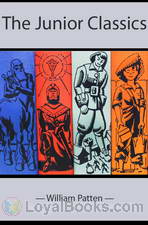 The Junior Classics
The Junior Classics
The purpose of The Junior Classics is to provide, in ten volumes containing about five thousand pages, a classified collection of tales, stories, and poems, both ancient and modern, suitable for boys and girls of from six to sixteen years of age. | |
By: William W.Denslow (1856-1915) | |
|---|---|
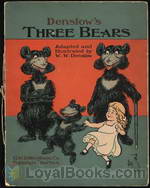 Denslow's Three Bears
Denslow's Three Bears
This version of the classic tale of the three bears has a heroine named Golden Hair. The jolly bears, instead of chasing her away from their home, come to live with her at Grandmother’s house. The recording can be enjoyed by itself, or you can read along. | |
 Denslow's Mother Goose
Denslow's Mother Goose
| |
 Denslow's Three Bears
Denslow's Three Bears
| |